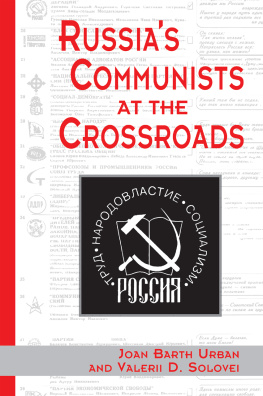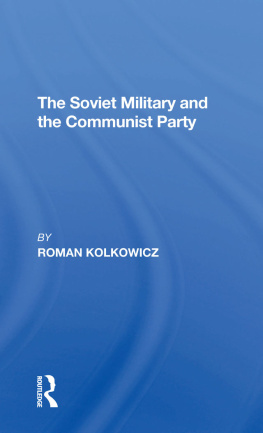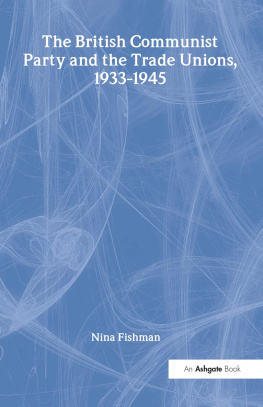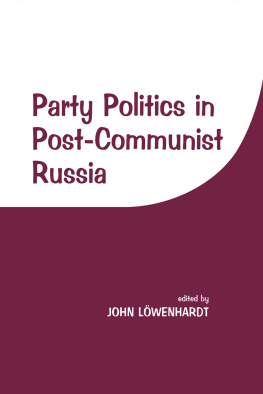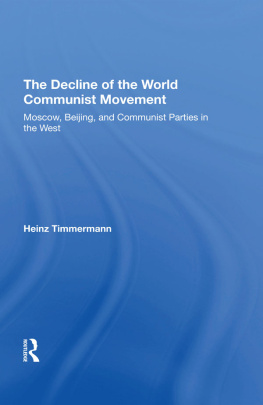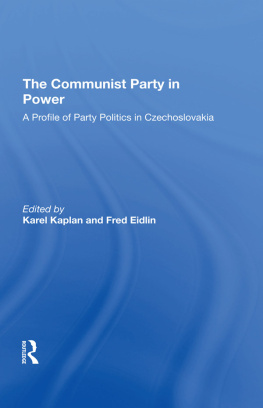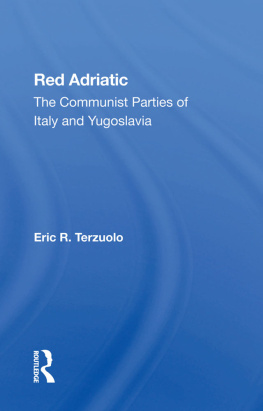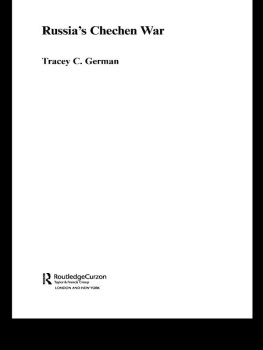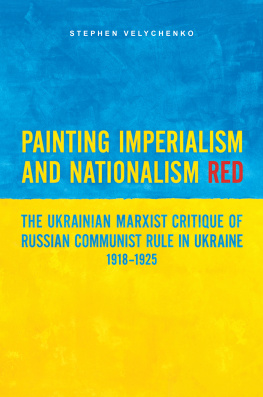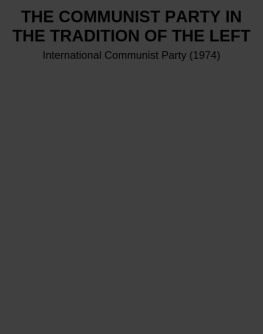First published 1997 by Westview Press
Published 2019 by Routledge
52 Vanderbilt Avenue, New York, NY 10017
2 Park Square, Milton Park, Abingdon, Oxon OX14 4RN
First issued in hardback 2019
Routledge is an imprint of the Taylor & Francis Group, an informa business
Copyright 1997 Taylor & Francis
All rights reserved. No part of this book may be reprinted or reproduced or utilised in any form or by any electronic, mechanical, or other means, now known or hereafter invented, including photocopying and recording, or in any information storage or retrieval system, without permission in writing from the publishers.
Notice:
Product or corporate names may be trademarks or registered trademarks, and are used only for identification and explanation without intent to infringe.
Library of Congress Cataloging-in-Publication Data
Urban, Joan Barth, 1934
Russias communists at the crossroads / Joan Barth Urban and
Valerii D. Solovei.
p.cm.
Includes bibliographical references (p.) and index.
ISBN 0-8133-2930-2.ISBN 0-8133-2931-0 (pbk.)
1. Kommunisticheskaa partia Rossisko Federatii.
2. CommunismRussia (Federation) 3. Russia (Federation)Politics and government1991 I. Solove, V. D. II. Title.
JN6699.A8K638 1997
324.247075dc21 | 96-53174
CIP |
Typeset by Letra Libre
ISBN 13: 978-0-8133-2931-4 (pbk)
In May 1993, I spent three weeks in Moscow searching for a local scholar with whom I might collaborate on a study of the communist movement in post-Soviet Russia. This was no simple task; the Russians, I was told, had turned their backs on communism. In due course, however, I met Valerii D. Solovei, a young researcher at the Gorbachev Foundation who shared my hunch that communism in Russia had not yet run its political course.
Over the next three years Valera and I worked together collecting documents, conducting interviews, scanning the communist press, and pondering the fortunes of a power elite which had so recently controlled the Soviet empire and its East European neighbors. For a time many of our acquaintances, in both Moscow and Washington, thought us a bit wacky. But during the Russian election season of 19951996, it became apparent to all that communism in Russia was not a spent political force.
Many colleagues and institutions have helped us to bring this project to fruition. The United States Institute of Peace awarded me a research grant, from March 1994 through August 1995, which provided funds for (among other things) my frequent travel to Moscow and Valeras collection of the necessary documentation in between my trips. We are both very grateful for this support. Thanks are due as well to the Catholic University of America for two faculty research grants which enabled me to observe firsthand the Russian parliamentary elections of December 1995 and the presidential race in 1996.
I would also like to express my gratitude to the Institute of Scientific Information on the Social Sciences of the Russian Academy of Sciences (INION RAN), to its director, Academician Vladimir A. Vinogradov, and to all my friends on its research staff for hosting me during the many field trips required for the completion of this book. A special word of thanks goes to Valerii P. Liubin for his facilitation of my institutional invitations and to Vadim V. Ishutin, the editor of INIONs weekly press review, Raznogolositsa, which is an indispensable research tool for all observers of contemporary Russian political parties and movements.
The idea for this book originated with Jane Leftwich Curry. At the 1992 convention of the American Association for the Advancement of Slavic Studies, Janey expounded with her customary brilliance upon the need to investigate and compare the successor communist parties of the former Soviet Bloc. If Janey gave me the idea, it was my husband, Laszlo, who inspired in me the confidence to undertake this project. With my background in Soviet studies and my work on the non-ruling communist parties of Western Europe, he argued, why should I not examine the development of the non-ruling communist parties in post-Soviet Russia?
For research assistance and logistical help of many different kinds, Valera and I are indebted to the following individuals: Michael D. Braun, Andrei P. Filippov, Sergei V. Gretsky, Nikolai V. Ivanitsky, James M. Quirk, Andrei V. Riabov, Rebecca G. Urban (my daughter, who by the time she was nineteen had traveled four times to Russia), Maia A. Vinogradova, Audrey A. Whitaker, and Tamara G. Zagladina. We also warmly acknowledge our frequent interlocutors on contemporary Russian politics as well as readers of various draft chapters of this book: Robert Otto, Peter Reddaway, Heinz Timmermann, and Marc Zlotnik. The many key personalities in the post-Soviet Russian communist movement who shared with us their insiders knowledge of our subject are cited in endnotes throughout the text.
Professor Robert Vincent Daniels played a unique role in the writing of this book. His seminal work, The Conscience of the Revolution, enormously influenced my own intellectual development as a graduate student many years ago. Our personal paths finally crossed during our parallel odysseys into the world of Italian communism during the Brezhnev era. Valera and I are grateful beyond measure that he agreed to serve as a reader of the manuscript for Westview Press. This volume owes much to his prompt and penetrating critiques of each chapter.
We have dedicated this book to our Russian and American families. I have already mentioned my American family. Valeras Russian family and my adoptive one in Moscow have yet to be given their due. To each of them go our love and gratitude for their unstinting attentiveness to our well-being during the course of this project.
Joan Barth Urban
Chevy Chase, Maryland

